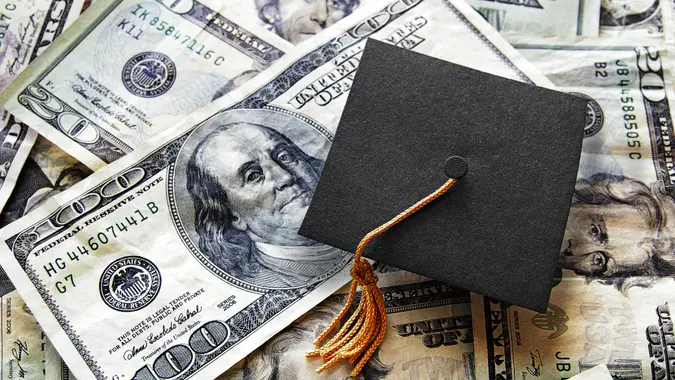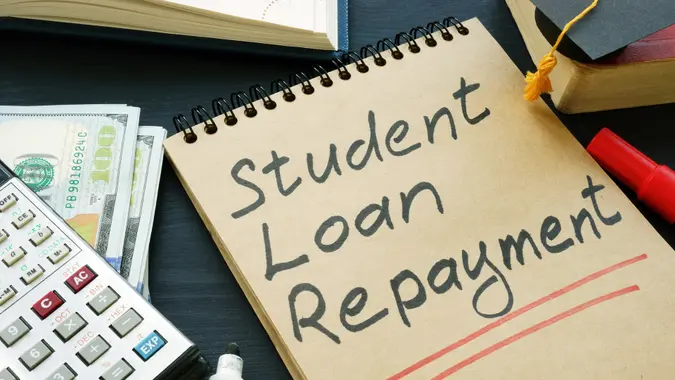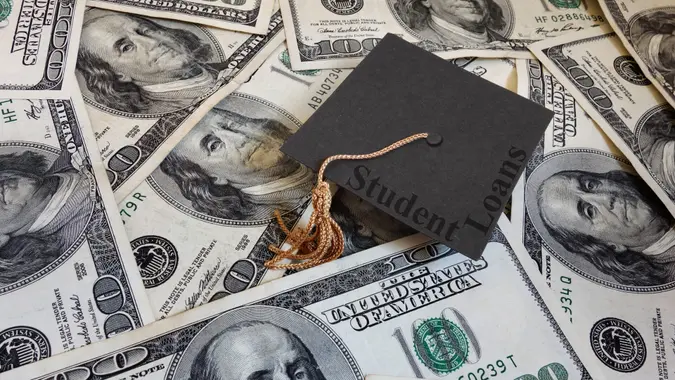How To Pay Off Student Loans Fast: 5 Strategies That Work

Commitment to Our Readers
GOBankingRates' editorial team is committed to bringing you unbiased reviews and information. We use data-driven methodologies to evaluate financial products and services - our reviews and ratings are not influenced by advertisers. You can read more about our editorial guidelines and our products and services review methodology.

20 Years
Helping You Live Richer

Reviewed
by Experts

Trusted by
Millions of Readers
If you’ve graduated with student loan debt, those monthly payments can quickly start to strain your budget. While you can stick to the full repayment term, many borrowers choose to learn how to pay off student loans fast. Although the journey might involve some tough sacrifices, it can ultimately help you save on interest and ease long-term financial stress.
How To Pay Off Student Loans Fast: 5 Best Methods
Want to speed up your student loan payoff? These five strategies can help.
1. Make More Than the Minimum Payment
If you want to pay off your student loan ahead of schedule, make extra payments each month to reduce your balance faster. Even small extra payments can make a big difference to your repayment timeline.
When making extra payments, ensure the funds are applied to the principal instead of the interest.
2. Refinance to a Lower Interest Rate
For borrowers with good credit and a steady income, refinancing into a loan with a lower interest rate could make sense.
With a lower interest rate, more of your monthly payment will go to paying down your balance, which can help you get out of debt faster.
3. Use the Debt Snowball or Avalanche Method
If you have multiple student loans, consider using the snowball or avalanche method.
- Snowball method:
- This method involves paying off your smallest loans first and working up to the bigger loan balances.
- Each time you pay off a loan, you roll the previous minimum payment into your snowball to tackle the next-largest debt.
- Avalanche method:
- This approach involves paying off your loans with the highest interest rates first.
4. Make Bi-Weekly Payments
If you make a payment with each bi-weekly paycheck, you’ll end up making one extra payment per year. This can shave a significant amount of time off of your loan.
5. Put Extra Money Toward Loans
Don’t be afraid to look outside of your day job’s paycheck to accelerate your debt repayment.
For example, you can use funds from tax refunds, bonuses or a side hustle to make extra payments toward your debt.
When possible, also consider cutting back on discretionary spending to free up more funds for debt repayment.
Why Pay Off Student Loans Early?
Paying off student loans ahead of schedule can:
- Save on interest: The faster you repay, the less interest you’ll owe.
- Free up your budget: Eliminate monthly payments and redirect funds toward other goals, like buying a home or investing.
- Lower financial stress: Eliminating your student loan debt might allow you to breathe a big sigh of relief.
Should You Refinance or Consolidate Your Student Loans?
When it comes to managing your student loans, refinancing and consolidation are both options.
- While consolidating allows you to merge multiple federal loans into a single payment, it’s not the right fit for everyone.
- The ability to tap into lower rates through a refinance is attractive for some borrowers but it won’t work for every situation.
The table below highlights the different advantages and disadvantages of refinancing and consolidation.
| Pros | Cons | |
|---|---|---|
| Refinancing | Lower interest rate, reduced payments | Requires strong credit, loss of federal loan benefits |
| Consolidation | Simplifies payments | May extend loan term, increasing total interest |
Government and Employer Programs That Help Pay Off Student Loans
Depending on your situation, you might have programs available to help you pay down your debt early. A few common opportunities include:
- Public Service Loan Forgiveness:
- If you have federal student loans, the PSLF program might forgive your loans after you complete specific requirements.
- Specifically, you’ll need to spend at least 10 years working for a government agency or qualifying non-profit organization and make 120 qualifying payments to have some or all of your federal student loans forgiven.
- Employer student loan repayment programs:
- Some employers offer student loan repayment assistance.
- If your employer offers this perk, you should consider taking advantage of it.
- State-sponsored loan repayment programs:
- In some states, student loan borrowers who work in certain careers, like teaching or healthcare, might qualify for state-sponsored repayment programs.
Pro Tip
As you pay down your student loans, look into federal or employer-sponsored repayment assistance programs. These can be especially helpful if you’re trying to learn how to pay off student loans fast with a low income — offering relief through forgiveness, matching payments or direct financial support.
Paying Off Student Loans Early: Pros and Cons
Paying off student loans early can save money and reduce stress, but it may limit cash flow and rule out forgiveness options. Here are some pros and cons to know:
| Pros | Cons |
|---|---|
| Saves money on interest | Less cash for investing or other expenses |
| Eliminates debt stress | May lose out on federal loan forgiveness programs |
| Frees up future income | Could impact savings for emergencies |
Final Take: Is Paying Off Student Loans Early Worth It?
For many borrowers, paying off student loans early is worth it. The decision to get rid of your student loans quickly can help you save money and reduce the financial stress in your life. If you want to speed up the process, focus on making extra payments, refinancing to lock in a lower interest rate and loan forgiveness programs.
As you pay off your student loans, don’t neglect your other financial priorities. Even if you choose to go all-in on debt repayment, make a plan for how you will move forward once the debt is gone. For example, you might make a plan to significantly increase your investing after your loans are taken care of.
FAQ
Here are the answers to some of the most frequently asked questions about paying off student loans early.- Does paying off student loans early hurt my credit?
- Although your credit score might dip temporarily after paying off your student loans, it often recovers quickly for anyone sticking with sound credit management practices.
- Should I save or invest before paying off student loans?
- While paying off your student loans early offers a guaranteed return, investing for your future could lead to bigger gains over the long term. The right answer varies based on your unique situation and goals.
- If you can't stand holding onto debt, paying it off early is often worth it. Remember that you might be able to pay down debt and invest at the same time. Even if this slows down your debt repayment progress, it could be worth it over the long term.
- What is the fastest way to pay off federal student loans?
- Making more than the minimum payment each and every month offers the fastest way to pay down your student loans.
- Is refinancing a good idea for paying off loans faster?
- If you are comfortable giving up federal student loan protections, refinancing into a private loan with a lower interest rate could help you accelerate your debt repayment.
- Can I negotiate a lower interest rate on my student loans?
- It never hurts to ask for a lower interest rate on your student loans. In some cases, a lender may be willing to offer you a lower interest rate.
 Written by
Written by  Edited by
Edited by 
























